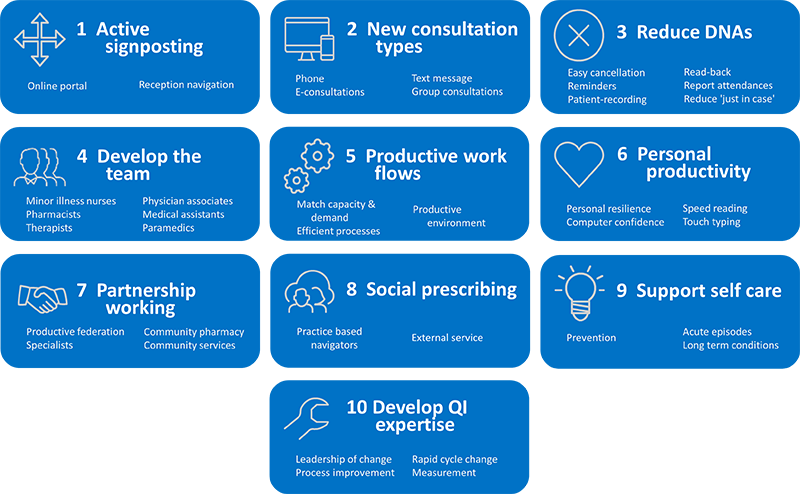Developing the team: Physician Associate Success
The idea of utilising physician associates to ease the chronic GP shortage has been floating around for a while now. It’s a topic we covered on the Practice Index blog in 2017 – you can find the article here – and there has been plenty of talk before and since. They also fit nicely into action number four of the NHS 10 High Impact Actions for releasing time for care.
Just to recap, Physician Associates (PAs) are defined by the Royal College of Physicians, Faculty of Physician Associates as ‘healthcare professionals with a generalist medical education, who work alongside doctors providing medical care as an integral part of the multidisciplinary team’. In so many ways they represent a new way of working where the GP doesn’t do, but instead acts as team leader and expert clinical adviser.
In its Competence and curriculum framework for the physician assistant, the Department of Health defines a PA as ‘a new healthcare professional who, while not a doctor, works to the medical model, with the attitudes, skills and knowledge base to deliver holistic care and treatment within the general medical and/or general practice team under defined levels of supervision’.
PAs are dependent practitioners working with a dedicated consultant or GP supervisor, but are able to work autonomously with appropriate support. Supervision of a qualified PA is similar to that of a doctor in training or trust grade doctor, in that the PA is responsible for their actions and decisions. However, the consultant is the clinician ultimately responsible for the patient.
A success story
PAs have been around for the best part of a decade, yet only recently have they begun to come to the fore. Indeed, at the last count, there were only in the region of 280 Physician Associates nationally working across 40 GPs.
Based on the experience of those in the profession, they are typically being used for (but not exclusively):
Patient level
· Telephone triage
· Pre-bookable appointments
· Same day bookable appointments
· Request for investigations/correspondence
· Referrals for non-elective and elective
· Support nursing home and residential home residents
· Chronic disease management
· Collaborative care co-ordination role
Practice level
· Support the achievement of QOF
· Contribution to education meetings
· Advise of CQC registration and responsibilities
· Help with the achievement of Enhanced Services e.g. INRs, family planning and sexual health clinics, minor surgery etc
· Take responsibility for case finding for example avoidable admissions audit
· Supportive part of the multi-disciplinary team
Charlotte Scott-Wilson PA-R MSc, is a PA at Taurus Healthcare and Fownhope Medical Centre in Hereford. Charlotte has successfully become part of the team at the practice, with colleagues saying that she is: “A positive addition to the team, with phenomenal knowledge and confidence, which has helped to ease the demand on the practice. It’s really nice to have another clinical member of staff to be able to direct patient queries to. The appointment has taken a lot of pressure away from the GPs, enabling them to concentrate on work most appropriate for them.”
A typical day
Speaking during a webinar on the subject delivered by NHS Networks, Charlotte outlined a typical working day for her in the practice. This consisted of working with the support of the duty doctor managing the urgent appointments and queries. During each session the duty doctor is released for 8 to 10 routine appointments with 5-minute supervision slots between, to allow for prescriptions to be signed (PAs have no statutory regulation so are unable to prescribe or request ionising radiation) or support with consultations. This means the net gain for routine appointments is 15 to 20 per day.
Morning Surgery
0830-1030 –Telephone triage (5-minute appts)
1030-1200 –Morning appointments (15-minute appts) – with patients following triage, low threshold for elderly and paediatric patients
Lunchtime
1200-1330 –Home visits, lab reports, admin, referrals, morning review with mentor
1330-1400 –Lunch
Afternoon surgery
1400-1500 –Afternoon telephone triage, day book, prescription queries (5-minute appts)
1500-1730 –Afternoon appointments (15-minute appts)
1730-1800 –Debrief with mentor
Positive impact
The impact Charlotte has made since joining the practice has been positive. Overall outcomes have provided the practice with:
· 40+ more routine appointments being offered each week
· Reduced waiting times for routine appointment – cut from 11 days to 4 days
· 6% reduction in unplanned admissions since Nov 2016
· Decreased patient return rate (19% to 11%)
· Increased team working across the practice
· Overall GP perception of workload improved
As the above shows, PAs are one way practice teams can be shaped to ease the GP shortage. It’s no wonder then that in the US, there are over 100,000 practising PAs, while they are also commonplace across Australia, Canada, New Zealand, Netherlands, Germany, India and Israel. Add into the mix the fact that they are paid at AFC Band 7 for new graduates, increasing at practice discretion with experience, and PAs could become a much more common sight than they are today.
Join the discussion on high impact actions here on our forum.





0 Comments